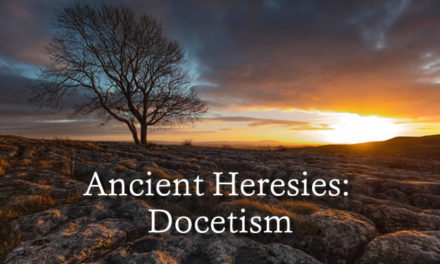Have you ever wondered how cults, aberrant groups, and charlatans get their money? They all claim to follow what the Bible teaches, but do they? Are they all necessarily wrong because they are wrong on other important doctrines? Let’s find out.
First Timothy 6:10 tells us that “the love of money is the root of all evil.” Because of what it can provide for us money appeals to our sinful natures. Perhaps this is the reason we periodically see reports of scandalously lavish lifestyles among the supposed followers of
Jesus who owned only his cloak. Senator Charles Grassley has recently held hearings to investigate the financial legitimacy of certain TV preachers.
We will look at what the Bible says in both the Old Testament and New Testament about money, then we will look at the very different ways various groups derive their money. There are those that teach the Old Testament concept of “tithing”, or giving 10%, to the
group and those that do not agree with that teaching, the “non-tithers”. Then there are the “communal” groups who divest themselves of personal property and assets and derive their support only from the group’s income. The “Seed Collectors” ask you to plant a “seed of faith” with a substantial donation to their ministry. And finally, there are the “sellers” who derive their money from what they sell as a product or service.
Biblical Teaching on Money
First, some background on what the Bible teaches about money is in order. In the Old Testament the tithing system was in place. The tithe existed before the Law and throughout the Middle East. A tithe was a “tribute” to the nearby King or Priest who ruled the land. This is exemplified in Abraham’s tithe to Melchisadec. It bought protection for the one paying the tribute.
Under the Mosaic Law tithes were paid by Israelites living within the borders of Israel (Leviticus 27:30, 32) on the increase of their crops and herds. The tithe was always in the form of agricultural products and not money. If an Israelite were to convert his crops or animals to cash then he was to pay 12%, not 10% (Leviticus 27:31).
Three tithes were paid annually for a total of 23 1/3%. The first tithe was on the increase in their crops and herds and was paid to the Levites in the Levitical cities in lieu of the Levites owning land like the other tribes (Numbers 18:21-24; Nehemiah 10:37). The Levites then paid a tithe of the tithe they received from the people to the Temple storehouse in Jerusalem (Numbers 18:25, 26; Nehemiah 10:38). This is what Malachi 3 is discussing about bringing the tithes into the “storehouse.”
Israelites who made their living from professions other than farming did not pay a tithe. Jesus, a carpenter, was not obligated to tithe. Peter, a fisherman, was not required to tithe. The second tithe was the festival tithe and was consumed by the people during their regular festivals (Deuteronomy 12:1-19; 14:22-26). It is interesting to note what Deuteronomy 14:22-26 says about this tithe. If the trip to the festival is too long then verses 25 and 26 say to convert the crops or animals to money and throw a party! It even approves “strong drink.” Have you ever heard a sermon on tithing that included that text? The third tithe was given every three years for the needs of the poor, widows and orphans
(Deuteronomy 14:28, 29; 26:12-13). Because Israel was a theocracy the Levites functioned as the civil servants and the several tithes were like our taxes today.
After Calvary there is nothing taught to the Church about tithing. The New Testament teaches what many today call “grace giving.” It is described in 2 Corinthians 9:7 as a completely voluntary response to God Who gave so much to us. Paul says, “Every man according as he purposes in his heart, so let him give; not grudgingly, or of necessity: for God loves a cheerful giver.” If God already “purposed” a tenth then there is no reason to say “as he purposes in his heart.” Also, to state a fixed percentage is to make that percentage a “necessity” or an “obligation” which is prohibited by 2 Corinthians 9:7. The only occurrences of the word “tithe” in the books of the New Testament are in the
gospels and Hebrews. In each instance the event takes place before Calvary and the establishment of the Church. There is no mention of tithing as taught to New Covenant believers. Tithing ceased with the Old Covenant and didn’t reappear in church history for centuries. God wants our response to Him to be the response of love, not necessity. We love God because He first loved us. We give to Him with all that we are, or have, because He gave us His best first.
The New Covenant teaches that Christians are to give regularly and generously. And we are to give to the needy, for evangelism and missions, to those who minister spiritual food to us. Where Christians give and how much is not specified in the New Covenant. In each of the ways various cults and aberrant groups teach about giving those same ways can be found among Christian groups as you may recognize. The various ways giving is taught includes the Tithers, the Non-tithers, the Seed Collectors, the Communal groups, and the Sellers.
The Tithers
Among the groups who teach tithing are the Mormons, the Seventh-day Adventists, and the Armstrongites. In an article carried in the LDS Church owned Deseret News (December 3,2007) there was an article discussing a backlash against tithing among various religious groups. The article commented on the attitude of the LDS Church toward this backlash. It said, “LDS faithful are asked to give 10 percent to the church or they may be restricted from participating in certain sacred ceremonies. Some evangelical Protestant churches require new members to sign covenants, promising to tithe or give generously. Those who openly refuse to tithe might be denied leadership roles or asked to leave the congregation.”
Mormons have humorously referred to their tithing teaching as “fire insurance.” In interviews with a Mormon Bishops the Mormons who want to obtain a “recommend” to enter a Mormon temple to perform their temple obligations have to prove they are paid up in their tithing requirement by producing a W-2 form.
Seventh-day Adventists teach tithing. Under “Guidelines for the Use of the Tithe” they say this on their church website “The tithe is the Lord’s and should be returned to the storehouse, the conference treasury, through the member’s home church.”Bring ye all the
tithes into the storehouse, that there may be meat in mine house, and prove me herewith, saith the Lord of hosts, if I will not open you the windows of heaven, and pour you out a blessing, that there shall not be room enough to receive it.”-Mal. 3:10.
The Worldwide Church of God recanted all of its false doctrines in the mid-1990’s and accepted an orthodox and evangelical doctrinal statement. Hence the teaching about money must be divided between pre-reformation WCG and their present day splinter groups on the one hand and the present day WCG, now called Grace Communion International, on the other. The pre-reformation WCG and present day splinter groups teach the triple tithe as it was practiced in Israel under the Law. Herbert Armstrong taught that the tithes go for church support (first tithe), festivals (second tithe), and care for the poor (third tithe).
If you search for “tithe” on the WCG website (https://www.gci.org/law/sct20) you will find the differences between the present day Grace Communion International (old WCG) and the WCG under Armstrong. Under the subject Second and third tithe, They say, “What other church knows these points? The second tithe is for God’s feast days. Other churches do not keep these feasts, so they have no reason to have second tithe. Third tithe is for the needy, primarily within God’s church.” The Grace Communion International says this view is no longer taught.
The Non-Tithers
Among the groups who do not teach tithing are the present day Worldwide Church of God, the Jehovah’s Witnesses, Church of Christ, Christian Science, and Islam. You can be assured the Worldwide Church of God was sincere in their recantation of the false doctrines taught by Herbert Armstrong because they gave up the triple tithe teaching. Between the large number of people who left the WCG for one of the many splinter groups, and the significant decrease of money coming in from the remaining members, the WCG faced serious financial struggles. But they held to their convictions.
Today the WCG (Grace Communion International) teaches grace giving. Each person is free to decide how much they give and to whom. On their website they say this, “The old covenant required simple percentages. Everyone knew how much was required. The new covenant has no set percentages. Instead, it requires more soul-searching, more training for the conscience, more selfless love for others, more faith, more voluntary sacrifice and less compulsion. It tests our values, what we treasure most, and where our hearts are. Are we generous, or not?”
The present day Grace Communion International is not a cult, nor is it an aberrant group. It is a member of the National Association of Evangelicals and practices the same faith we do.
The Watchtower Society of Jehovah’s Witnesses is a cult. There are no points of agreement between Christians and the Witnesses on any major doctrine. The Watchtower does not teach the 10% tithe. Instead it leaves its members free to give as they please on the local level. In each Kingdom Hall there is a box at the back of the Hall where the Witnesses may deposit whatever donations they want to give.
The Church of Christ removes itself from evangelical orthodoxy by its teaching about baptismal regeneration. They say you must be baptized in order to be saved. Regarding money, however, they are very orthodox. In an Internet discussion forum one ex-Church of Christ member said, “To give credit where credit is due, this is something the CofC is actually right about, (IMO). Paul uses 2 chapters (2 Cor 8&9 ?) to teach about Christian giving. “Not of obligation and not out of compulsion”. Tithing is both; being under obligation and under compulsion.
Christian Scientists do not pay a tithe to the Mother Church in Boston, nor to their local church. They pay a “per capita tax” that is assessed to each member and is managed by the Mother Church. On their website they say, “Christian Science General Fund: This fund provides the most flexibility in use. It can be used for any of the Church’s missionary activities and programs, for maintenance and capital improvements, or for administrative and operating expenses. Unless otherwise designated, per capita tax payments from Church members are placed in this fund.”
Islam does not assess any tax, dues, tithe, or compel any donations. However, they do expect each practicing Muslim to give 2.5% of their income. Regarding that the Koran says, “And they are ordained naught else than to serve Allah, keeping religion pure for Him, as men by nature upright, and to establish worship and to pay the poor-due (Zakah). That is true religion.” (Quran 98:5)
The “Seed” Collectors
This category is limited to the charlatan TV preachers who ask viewers to send in a $1000 donation as “seed faith.” They will tell you that God will multiply it back to you tenfold in return for your faithful generosity. It is true that God rewards faithful generosity. He does not promise to honor gullibility. The most conspicuous proponent of this was Robert Tilton but many others use it in some form. Also, notice something about these charlatans, they want you to send that donation to them, not the guy on the other channel.
Communal Sharing
Those who give 100%, or close to it, are usually in communal groups, but not all. People who join the Moonies are known to give over all, or much, of their possessions or money to the Unification Church. There are utopian cults that existed in the northeastern USA in the early 1800’s such as the Oneida Community, the Shakers, and others who devoted themselves to a communal system of self-support.
Today there are numerous small cultic groups that “share all things in common” as the early Christians did in Jerusalem because they believe it is ordained in Acts as a preferable, or superior, system for believers. However, just because something existed in scripture does not mean it is commanded, or necessarily superior.
Two dangers of this communal system are the socialistic tendency toward the lowest common denominator of productivity, and the other is the opportunity for greed by the communal leader. The Jamestown Colony found this socialistic and communal system to be disastrous and abandoned it.
The Sellers
Some cults make their money by selling “products” or “services.” Among these are the Scientologists, the Jehovah’s Witnesses, and the Moonies.
Scientology offers what they call “auditing” as a way to remove “engrams”, or painful memories and experiences that hinder the individual from becoming “clear.” The “clear” individual is unhindered by false thinking coming from the unconscious and based on experiences. They say he is “unabberated.” The cost of the auditing sessions is quite expensive. Stories have been told of people who emptied their bank accounts to pay for more auditing sessions.
Authors Note: the following paragraph about the Watchtower Society was accurate when the article was written.
——The Watchtower Society of Jehovah’s Witnesses supports its national and international organization by the selling of books and magazines published by the organization. The individual Witness will buy the magazines and books at their Kingdom Hall and offer them in their door to door canvassing. When they receive a donation at the door for literature they turn in the donation and it is sent to Watchtower HQ. So, the literature is paid for twice in many cases. The profit margin for the literature is quite large. The Society prints the Watchtower magazine for pennies per copy. With 23 million copies every two weeks and a similar number of Awake magazines every two weeks,
plus scores of millions of copies of every book, the Society realizes a very large amount of money. The six million Jehovah’s Witnesses make a very large and unpaid sales force. The estimate is the Society brings in just under $1 billion per year. The local Kingdom Halls are supported by the local congregations from their free will donations as described above.——
Authors Note: Since this article was originally written there have been many changes in the Watchtower Society regarding money. First, they no longer print anywhere near the volume of literature they once did. Because of that the cash flow from it has almost ceased. Now they only publish several Watchtower and Awake magazines per year. They have begun using literature stands in public pedestrian areas replacing much of their door to door activity.
But far more impactful on their finances in recent years has been a flood of lawsuits against them for child sexual abuse. The payouts for these judgments have amounted to scores of millions of dollars in settlements. Here is a link to a website detailing the known cases – https://jwfacts.com/watchtower/child-abuse-settlements.php. One of the examples given in this website is the Australian Royal Commission investigation begun in 2015 of over 1000 cases of child sexual abuse. Those are only the known, or reported, cases. The Commission reported that internal policy by the Watchtower Society presented a barrier to legally required reporting. The policy is that two witnesses are
required to qualify for reporting. In child sexual abuse cases the only two witnesses are the perpetrator and the victim. Many Jehovah’s Witnesses have learned of this scandal and have withdrawn, or faded, from the Society.
This “fading” has led to another element in the financial troubles of the Society, the decline in active membership. This large decline in active members has led to the closure of many Kingdom Halls around the world. A low attendance Hall will be closed and its members transferred to another struggling Hall. This presents a better appearance of vitality in the membership. The money from the sale of those closed Halls has propped up the Society financially for the short term. Also sold are the headquarters properties in Brooklyn, NY. The Society has moved its headquarters and operations to Warwick, NY, a rural area north of New York City. At an annual meeting in 2017 the Watchtower
Governing Body announced that their Annual Yearbook would cease to be published. If the Society is growing you want to let everyone know. If it is declining you don’t want to announce it. The Pew Research Center said of Jehovah’s Witnesses, “Jehovah’s Witnesses have a low retention rate relative to other US religious groups. Among all US adults who were raised as Jehovah’s Witnesses, two-thirds (66%) no longer identify with the group.” This affects income for the Society.
The Moonies are known for the trinkets and flowers they sell on the streets. They are unpaid salesmen who turn over every dollar of income from their sidewalk fundraising to the Unification Church. One Moonie with whom the author spoke was a Japanese lady who had married a Polish man in one of Moon’s mass weddings. The couple had a short honeymoon and then parted ways to go to different parts of the world to fundraise.
Conclusion
The Apostle Peter warned us about being deceived into giving our money to false prophets. He said in 2nd Peter 2:3, “And through covetousness shall they with feigned words make merchandise of you: whose judgment now of a long time lingereth not, and their damnation slumbereth not.”
Man in his sinful condition is strongly attracted to money. It will buy whatever the sinful flesh desires. For that reason it is a key criteria for Christians in discerning the biblical, moral, and ethical quality of any group claiming biblical authority and truth. But in order for Christians to practice that discernment we must first know the truth ourselves. Our financial responsibility to God is spelled out clearly in the Epistles, especially Paul’s 2nd Epistle to the Corinthians and Chapters 8 and 9. I would urge each of our readers to study what the New Testament says about our responsibility as stewards.
By David Henke






